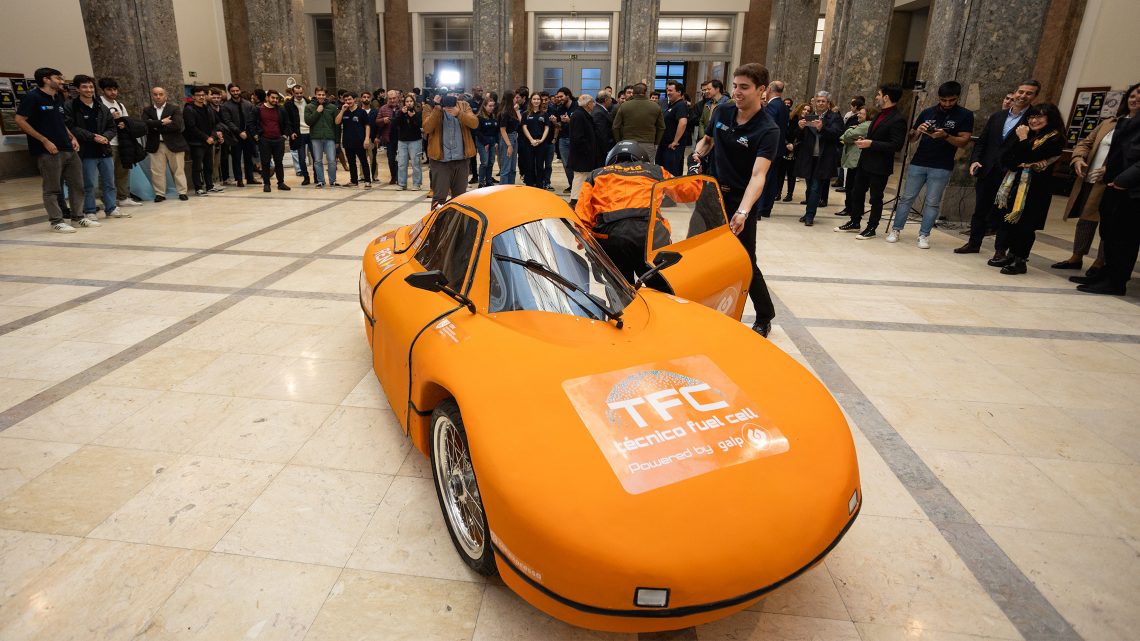Técnico Fuel Cell presents first hydrogen car developed by students in Portugal
The prototype was presented at an event that filled Técnico’s Great Hall and was attended by the Minister for the Economy and the Sea.

“The car will work”. This was the most heard sentence in Técnico’s Great Hall on the afternoon of March 28th, at the roll-out event for the hydrogen-powered car developed by the Técnico Fuel Cell (TFC) students. The ceremony was attended by the president of Técnico, Rogério Colaço, the Minister for the Economy and the Sea, António Costa Silva, and the Head of Open Innovation at Galp (the main sponsor of the project), Manuel Andrade.
With 130kg, a shape inspired by a drop of water and only one drive wheel (for efficiency reasons), the prototype features PEM (Proton Exchange Membrane) fuel cell technology. The use of hydrogen as a fuel guarantees the production of clean, sustainable energy to power the vehicle’s electric motor. This way, instead of polluting fumes, pure water comes out as waste.
“Having this Great Hall full on this rainy day is already a huge success,” Rogério Colaço said with a smile at the start of his speech, in front of a room full of spectators. For Técnico’s president, “what really sets [the school] apart is the number of student organizations we have that manage to build things from scratch”. Giving a few examples, Rogério Colaço listed “[this] prototype of a sustainable hydrogen-powered car, a Formula Student car, a solar-powered boat, a satellite completely designed, conceived and built in Portugal that is going into space in the summer” and further admitted that he was “not being completely fair” because there were “many more excellent examples” that he didn’t get to list.
In a speech in which he assured that “the car will work”, the president also recalled that “Técnico was created to help the country in its economic development, creating technology and knowledge and putting them at the service of the people”. “113 years later, student groups like the TFC are proof that Técnico continues to fulfill this mission,” he concluded.
Also certain that “the car will work”, the Minister for the Economy and the Sea, António Costa Silva, recalled the ‘pact’ that brought him to this event. “During the inauguration of the Técnico Innovation Center, the first time I saw the TFC team in action, I promised that the day the car was up and running, I would be here,” recalled the retired Técnico professor, who completed a degree in Mining Engineering and a PhD in Petroleum Reservoir Engineering (the latter in partnership with the Imperial College).
Five months after making the promise, the minister said that “it is a great joy to return to Técnico”, stressing that “it is also my school and one of the most extraordinary engineering schools we have – a benchmark in Portugal, Europe and the world”. In a speech focusing on the need to combat climate change, António Costa Silva stressed that “if we don’t change the paradigm of mobility in cities with cars of this type, we will ‘hit a wall’ in environmental protection”. For this reason, he said that “the impact that [the TFC prototype] can have is extraordinary”.
Manuel Andrade is also a Técnico alumnus. With a degree in Mechanical Engineering, he is currently Head of Open Innovation at Galp, the project’s main sponsor and a member of Técnico’s Partner Network. In his speech, he stressed that, for the company, Técnico is a “very important source of talent”.
Duarte Soares, team leader of Técnico Fuel Cell, thanked those present, the families and friends of the 49 members of the project and the other student groups at the school. In a speech that recalled the challenges and obstacles to the completion of this prototype, the TFC representative traced the journey of this group and how, over time, they have accumulated the help of other students, teachers and more than ten companies supplying essential materials and technologies for the construction of the vehicle, as well as financial and technical support.
There was also time for the representatives of the different departments of Técnico Fuel Cell to give a speech and take a group photo. Even though they have different roles within the organization, the four speakers from the Mechanics, Electronics, Hydrogen and Communication departments made a point of emphasizing the same aspect in all their speeches – “the car is going to work”.
Minutes later, surrounded by an expectant crowd in the atrium of the main building and with the TFC pilot already in the driver’s seat, the orange-colored prototype was ready. With a growing eagerness that would be replaced by cheers and victorious honking seconds later, as the vehicle made its way around the entrance to the building, the phrase “the car is going to work” resounded in everyone’s mind… and then the car did.
